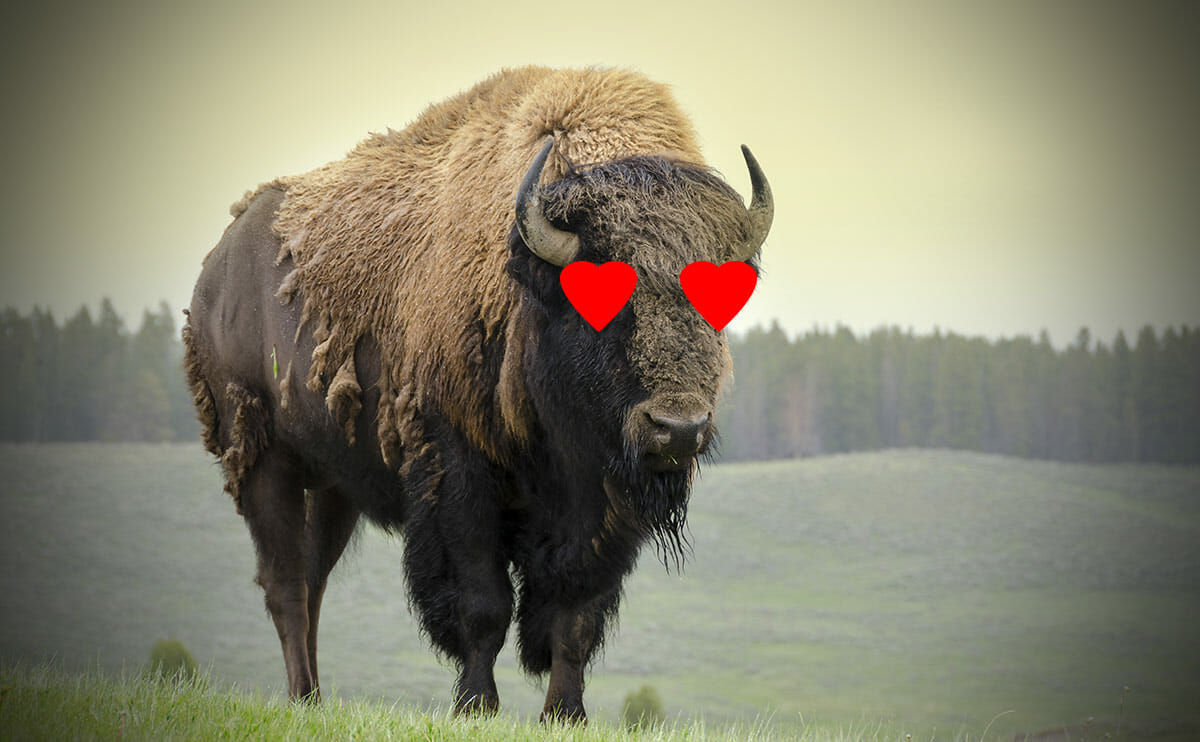Most modern livestock is bred using artificial insemination. But bison? They do it all natural.

It’s an arrangement that puts these animals in a curious existential limbo between plain old livestock and icons of wild, wide-open freedom. Accordingly, bison farmers’ management and marketing techniques tend have a strong au naturel flavor: no growth hormones, no antibiotics except to treat disease, free-range, grass-fed, et cetera et cetera.
“Our goal has been to handle them as little as possible and leave them in that semi-wild state, because that’s part of their allure ”“ just this natural, wild animal,” says Debbi Tanner, of Creamery Brook Bison in Brooklyn, Connecticut.
That means no artificial insemination. Bison may generally be confined in pastures these days, but they still do it just like they did when they roamed the Great Plains by the millions.
That means no artificial insemination (AI), either. Bison may generally be confined in pastures these days, but they still do it just like they did when they roamed the Great Plains by the millions. (A large majority of pigs and dairy cows in the U.S. are bred with AI, though it remains relatively uncommon for beef cattle.)
“We definitely choose to go the natural route,” says Jim Matheson, assistant director of the National Bison Association. “Our producers are very committed to raising these animals responsibly and as nature intended.”
There are good logistical reasons to let bison just do it on the range, too: they’re big, they can be aggressive and because they’re not technically domesticated, they don’t usually do well with confinement or close human contact. Since semen collection and AI require contact of the closest kind, it’s not a terribly compatible practice with bison farming.
That’s not to say that bison AI isn’t possible. After some largely unsuccessful research on the subject at Texas A&M in the mid-90s, a veterinarian from Stratford, Okla., named Gerald Parsons pulled it off with his bison herd in 1996. At the time, we were facing a very practical problem: The Grand National Champion Bull he’d purchased the year before proved to be a monogamist that stuck with one cow and one cow only.
‘If you get ’em stirred up and aggravated bad, you can’t get semen off ’em, [but] if you let ’em act like it’s their idea … you can get a lot of semen.’
After devising a proper technique for freezing bison semen (this bit, he says, was the Achilles heel of the Texas A&M research) Parsons achieved an 84 percent conception rate with his bison cows.
The next year, on the advice of some other bison farmers, Parsons tried putting a second bull in the pasture with his monogamous champion. Facing competition from this young and eager newcomer, the champion bull went buck wild.
“Sure enough, he went to work and did everything like he was supposed to,” Parsons says.
Parsons still freezes semen from his bulls, but he hasn’t routinely used AI since that one year and he isn’t aware of any other bison farmers who use AI. (He is, however, currently trying to cut his way through a bunch of international red tape that will allow him to accept an invitation to do some bison AI in Romania.)
Parsons argues that successful bison AI has everything to do with good animal handling: “If you get ’em stirred up and aggravated bad, you can’t get semen off ’em, [but] if you let ’em act like it’s their idea … you can get a lot of semen.” And he points out that AI doesn’t change bison genetics any more than selecting a good bull to do its thing at its leisure out beneath the wide-open sky.
Still, he says, there’s a perception that AI is unnatural, and that runs contrary to the all-natural philosophy that dominates bison farming in North America.
Factor in the practical barriers that exist to bison AI, then, and breathe deep: It looks like these animals’ sex lives will remain gloriously unbridled and untamed.